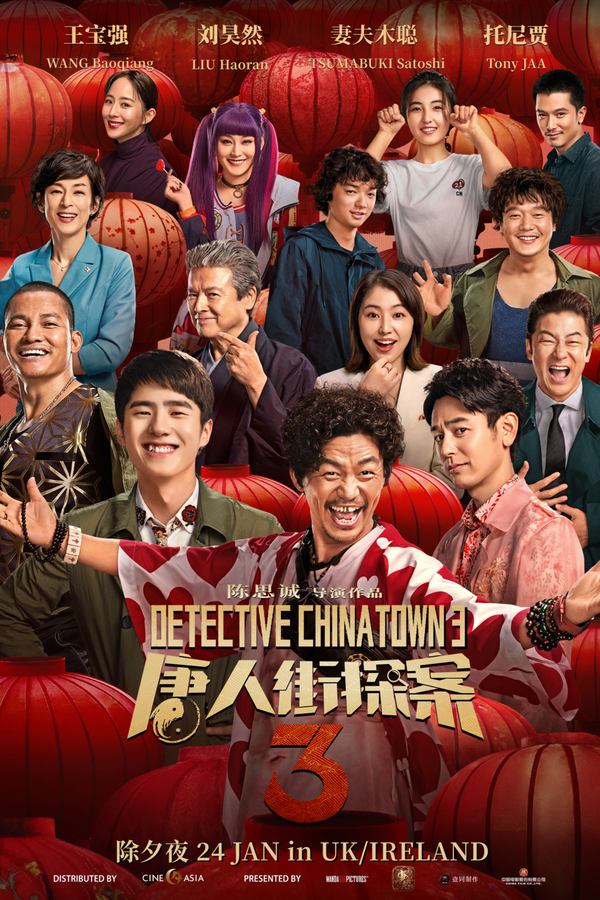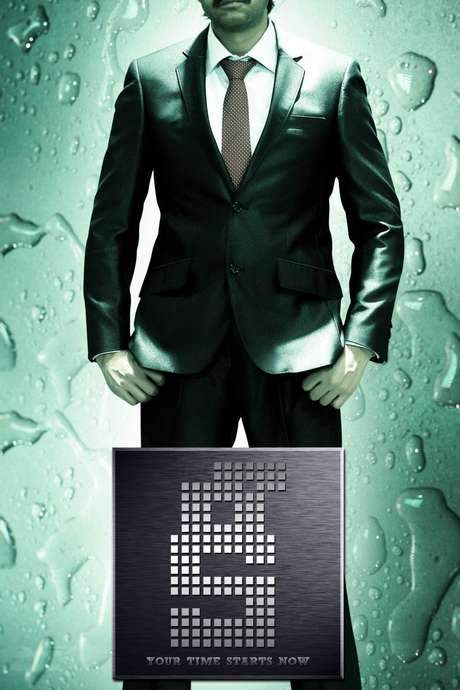
Teiichi: Battle of Supreme High
Year: 2017
Runtime: 118 mins
Language: Japanese
Director: Akira Nagai
Teiichi Akaba attends a highly regarded private high school renowned for cultivating future politicians and bureaucrats. Driven by a dream to become prime minister, he sets his sights on the school’s student council presidency. Winning the election offers significant advantages and increased opportunities for advancement in the political sphere, leading to a fierce power struggle amongst the student body as candidates vie for the coveted position.
Warning: spoilers below!
Haven’t seen Teiichi: Battle of Supreme High yet? This summary contains major spoilers. Bookmark the page, watch the movie, and come back for the full breakdown. If you're ready, scroll on and relive the story!
Teiichi: Battle of Supreme High (2017) – Full Plot Summary & Ending Explained
Read the complete plot breakdown of Teiichi: Battle of Supreme High (2017), including all key story events, major twists, and the ending explained in detail. Discover what really happened—and what it all means.
The Kaitei Supreme High School stands as Japan’s most famous aristocratic academy, a place where only about 800 students across the nation have the chance to study. Its powerful ties to major business circles and political figures mean that the person who leads the student union sits close to real influence, potentially stepping into a cabinet-like role. Yet reaching that coveted presidency isn’t easy—the unwritten rule is that you must first be the class monitor of your year, a gatekeeping role that tests leadership, popularity, and cunning.
In April, with the new term underway, Teiichi Akaba—a first-year student dreaming since childhood of becoming Prime Minister—is chosen as the monitor of Class 1. Teiichi’s ascent is helped by more than just his resolve; his father is a dignitary within the political world, which only heightens the stakes and the scrutiny surrounding his every move. Motivated by a mix of ambition and a sense of duty, Teiichi elects to throw his hat into the race for the student union presidency, aiming to mold the future of the school and, by extension, the country.
But Teiichi’s path is blocked by formidable rivals. One is Kikuma Tōgō, the shrewd monitor of Class 2 who carries the burden of being the son of Teiichi’s father’s political rival. Another is Dan Ōtaka, the Class 3 monitor who embodies exceptional academic talent and comes from a lower-middle-class background, a background that contrasts sharply with the school’s gilded milieu. The competition is not merely about grades or eloquence; it’s about alliances, media optics, and the ability to navigate a network where every move could become national news.
To mount an effective challenge, Teiichi chooses a strategic alliance with a rising star from the upper classes: the Class 6 monitor of the second year, Roland Himuro. Roland’s leadership and clout make him a prime ally in the bid to win the presidency, especially as Teiichi’s dream requires not just votes but a broad coalition. Roland faces a real obstacle in the form of Okuto Morizono, the formidable Class 5 monitor who stands as Roland’s main rival within the student hierarchy. The contest is thus framed as a contest of influence among peers who represent different social strata, each with their own agendas, loyalties, and long-term ambitions.
The campaign unfolds in the hallways of power within the school as Teiichi formally offers to be the flag raiser for Roland Himuro, a symbolic gesture meant to rally support and present a unified front. This moment, though, becomes a crucible. During the student convention, Kikuma Tōgō attempts to undermine Teiichi by maneuvering to cut in on the flag line, trying to cast blame on Teiichi for missteps or misdeeds. The maneuver is a test of Teiichi’s resolve and his ability to manage controversy in real time. Yet the plan backfires on the schemer; Kikuma’s trickery fails to dominate the proceedings, and the course of events ends up strengthening Teiichi’s standing, earning him the trust of Roland Himuro and, by extension, a broader base of support within the school.
From that turning point, the campaign evolves beyond mere face-to-face campaigning. Teiichi must grapple with the complexities of strategy, the growing importance of social networks, and the relentless demands of maintaining high academic performance. The narrative makes clear that the road to leadership at The Kaitei Supreme High School is as much about wits and relationships as it is about votes. The pressure to outmaneuver entrenched rivals who are both politically and socially formidable intensifies, and Teiichi flirts with the thought of sacrificing everything—perhaps even his life—to stand against those who oppose him and threaten his path to power.
As the story progresses, the “battle” within The Kaitei Supreme High School becomes a tapestry of shifting loyalties, subtle betrayals, and calculated traps. Each move by Teiichi, each counter-move by Kikuma, Dan, Roland, and Okuto, contributes to a larger drama about ambition, responsibility, and the cost of leadership in a world where the line between student politics and national politics blurs. The stakes are elevated not only by the prestige attached to the presidency but also by the palpable possibility that the game will demand personal sacrifice.
Throughout this high-stakes journey, Teiichi’s character is tested on multiple fronts: his strategic planning, his ability to cultivate allies, his performance in academics to maintain credibility, and his willingness to confront adversaries who see him as a stepping stone or a threat to their own agendas. The environment of The Kaitei Supreme High School—a microcosm of Japan’s political arena—serves as a rigorous proving ground where intellect, loyalty, and nerve are deployed in equal measure. The story weaves together the charm and danger of elite circles, showing how a single class monitor can ignite a multi-year, multi-layered campaign that may redefine who leads the school and, ultimately, what leadership means within this exclusive world.
In the end, Teiichi’s pursuit is as much about shaping the school’s culture as it is about winning the presidency. The path is fraught with alliances, rivalries, and the constant pressure to outthink, outtalk, and outlast the competition. The Kaitei Supreme High School becomes a battleground where strategy, social dynamics, and academic excellence converge, and where the line between triumph and tragedy can be razor-thin. The stage is set for an ongoing struggle, with betrayals and traps awaiting at every turn, as Teiichi and his allies navigate the intricate politics of a school that mirrors a much larger political world. The campaign has begun, and the outcome remains a test of endurance, intellect, and courage.
Last Updated: October 01, 2025 at 13:06
Explore Movie Threads
Discover curated groups of movies connected by mood, themes, and story style. Browse collections built around emotion, atmosphere, and narrative focus to easily find films that match what you feel like watching right now.
Political power struggle movies like Teiichi: Battle of Supreme High
Stories where confined social arenas become battlegrounds for ultimate power.If you liked the tense, strategic maneuvering in Teiichi: Battle of Supreme High, explore more movies about intricate power plays. These films often feature ambitious characters in competitive settings like schools, offices, or royal courts, where every move is calculated and the stakes are intensely personal.
Narrative Summary
These narratives typically follow a driven protagonist navigating a complex social hierarchy. The plot revolves around a clear objective, such as winning an election or gaining influence, and unfolds through a series of intellectual challenges, betrayals, and tactical victories that test the character's resolve and ethics.
Why These Movies?
Movies are grouped here for their shared focus on cerebral conflict within a closed system. They share a tense, competitive tone, steady pacing that builds suspense, and a thematic exploration of ambition, class, and the intoxicating nature of power.
Movies with intellectual tension similar to Teiichi: Battle of Supreme High
Experiences where the primary tension comes from strategic mind games and rivalry.Fans of the cerebral competition in Teiichi: Battle of Supreme High will enjoy these movies. They capture the same vibe of high-stakes intellectual battles, where characters use wit and strategy to win, creating a gripping and tense viewing experience focused on mental agility.
Narrative Summary
The narrative journey in these films is one of mental fortitude. Characters face off against equally sharp rivals in contests of will, strategy, and influence. The conflict unfolds through debates, schemes, and psychological warfare, keeping the audience engaged with the constant question of who will outthink the other.
Why These Movies?
These films are united by their reliance on intellectual tension as the main driver of drama. They share a specific vibe: a steady, methodical pace that allows strategies to unfold, a medium intensity rooted in psychological pressure, and a focus on the thrill of the mind game.
Unlock the Full Story of Teiichi: Battle of Supreme High
Don't stop at just watching — explore Teiichi: Battle of Supreme High in full detail. From the complete plot summary and scene-by-scene timeline to character breakdowns, thematic analysis, and a deep dive into the ending — every page helps you truly understand what Teiichi: Battle of Supreme High is all about. Plus, discover what's next after the movie.
Teiichi: Battle of Supreme High Timeline
Track the full timeline of Teiichi: Battle of Supreme High with every major event arranged chronologically. Perfect for decoding non-linear storytelling, flashbacks, or parallel narratives with a clear scene-by-scene breakdown.

Characters, Settings & Themes in Teiichi: Battle of Supreme High
Discover the characters, locations, and core themes that shape Teiichi: Battle of Supreme High. Get insights into symbolic elements, setting significance, and deeper narrative meaning — ideal for thematic analysis and movie breakdowns.

Teiichi: Battle of Supreme High Spoiler-Free Summary
Get a quick, spoiler-free overview of Teiichi: Battle of Supreme High that covers the main plot points and key details without revealing any major twists or spoilers. Perfect for those who want to know what to expect before diving in.

More About Teiichi: Battle of Supreme High
Visit What's After the Movie to explore more about Teiichi: Battle of Supreme High: box office results, cast and crew info, production details, post-credit scenes, and external links — all in one place for movie fans and researchers.

Similar Movies to Teiichi: Battle of Supreme High
Discover movies like Teiichi: Battle of Supreme High that share similar genres, themes, and storytelling elements. Whether you’re drawn to the atmosphere, character arcs, or plot structure, these curated recommendations will help you explore more films you’ll love.
Explore More About Movie Teiichi: Battle of Supreme High
Teiichi: Battle of Supreme High (2017) Scene-by-Scene Movie Timeline
Teiichi: Battle of Supreme High (2017) Movie Characters, Themes & Settings
Teiichi: Battle of Supreme High (2017) Spoiler-Free Summary & Key Flow
Movies Like Teiichi: Battle of Supreme High – Similar Titles You’ll Enjoy
Classroom of the Elite (1000) Plot Summary & Ending Explained
Samurai Sensei (2017) Story Summary & Characters
Prince of Legend (2019) Movie Recap & Themes
The Prince of Tennis (2006) Ending Explained & Film Insights
Dreamy Fifteen (1980) Complete Plot Breakdown
Be-Bop High School (1985) Detailed Story Recap
The Samurai (1987) Detailed Story Recap
School in the Crosshairs (1981) Full Movie Breakdown
School in the Crosshairs (1981) Plot Summary & Ending Explained
Fighting Elegy (1966) Movie Recap & Themes
High School Teacher (1993) Full Movie Breakdown
Takara-kun and Amagi-kun (1000) Story Summary & Characters
Project: High Council (1000) Story Summary & Characters
Anime Supremacy! (2022) Film Overview & Timeline
Billion x School (1000) Ending Explained & Film Insights









































